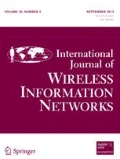Abstract
We analyze the asymptotic cost of discovering a route within a flat ad hoc network and we show that one can discover a route with cost that is proportional only to the area of the network, which is independent of the number of network nodes. Furthermore, we show that this is optimal and that bordercasting (a query propagation protocol where a node retransmits a query to a set of nodes at some hop-distance away) possesses this density-independence property. We present the design of bordercast and the associated maintenance protocols, and we evaluate their performance. In particular, we highlight that the aggregation of local information by bordercasting at each network node is a fundamental building block for the construction of scalable protocols in flat ad hoc networks.









Similar content being viewed by others
Notes
The results are not expected to be significantly different for other transport-layer protocols.
References
Gupta P., Kumar P. (2000) The capacity of wireless networks. Trans. on Info. Theory 46:338–404
Grossglauser M., Tse D. (2002) Mobility increases the capacity of wireless adhoc networks. IEEE/ACM Transactions on Networking 10:477–486
O. Arpacioglu and Z. J. Haas, On the Scalability and Capacity of Wireless Networks with Omnidirectional Antennas. IPSN’04, Berkeley, CA, April 26–27, 2004.
P. Samar, M. Pearlman, and Z. Haas, Hybrid routing: The pursuit of an adaptable and scalable routing framework for ad hoc networks. in Handbook of Ad Hoc Wireless Networks, CRC Press, 2003.
Samar P., Pearlman M. R., Haas Z. J. (2004) Independent zone routing: An adaptive hybrid routing framework for ad hoc wireless networks. IEEE/ACM Transactions on Networking 12(4):595–608
D. B. Johnson and D. A. Maltz, Dynamic source routing in ad hoc wireless networks. in Mobile Computing, Kluwer Academic Publishers, 1996.
C. E. Perkins and E. M. Royer, Ad hoc on-demand distance vector routing, in Workshop on Mobile Computing Systems and Applications pp. 90–100, Feb. 1999.
B. Bellur and R. G. Ogier, A reliable, efficient topology broadcast protocol for dynamic networks, in IEEE INFOCOM ’99, March, 1999.
T. Clausen, P. Jacquet, A. Laouiti, P. Muhlethaler, A. Qayyum, and L. Viennot, Optimized link state routing protocol, in IEEE INMIC, 2001.
M. Joa-Ng, I. -T. Lu, A peer-to-peer zone-based two-level link state routing for mobile ad hoc networks, IEEE Journal on Selected Areas in Communications, Vol. 17, No. 8, pp. 1415–1425, August, 1999.
V. Ramasubramanian, Z. J. Haas, E. Sirer, SHARP: A hybrid adaptive routing protocol for mobile ad hoc networks, in ACM International Symposium on Mobile Ad Hoc Networking and Computing (MOBIHOC), June 2003.
N. Navid, W. Shiyi, and C. Bonnet, HARP: Hybrid Ad hoc Routing Protocol International Symposium on Telecommunications (IST).
Z. Cheng and W. Heinzelman, Flooding strategy for target discovery in wireless networks, in ACM MSWiM, Sept. 2003.
S.-Y. Ni, Y.-C. Tseng, Y.-S. Chen, and J.-P. Sheu, The broadcast storm problem in a mobile ad hoc network, in ACM/IEEE International Conference on Mobile Computing and Networking (MOBICOM), ACM Press, pp. 151–162, August 1999.
Y. Sasson, D. Cavin, and A. Schiper, Probabilistic broadcast for flooding in wireless mobile ad hoc networks, in IEEE Wireless Communications and Networking Conference, March 2003.
Z. J. Haas, J. Y. Halpern, and L. Li, Gossip-based ad hoc routing, in IEEE INFOCOM ’02, June 2002.
V. K. Paruchuri, A. Durresi, D. S. Dash, and R. Jain, Optimal flooding protocol for routing in ad hoc networks, in IEEE Wireless Communication and Networking Conference, March 2003.
Guha S., Khuller S. (1998) Approximation algorithms for connected dominating sets. Algorithmica 20:347–387
J. Wu, H. Li, A dominating set based routing scheme in ad hoc wireless networks, in International Workshop of Discrete Algorithms and Methods for Mobile Computing and Communications, August 7–14, 1999.
B. Williams and T. Camp, Comparison of broadcasting techniques for mobile ad hoc networks, in ACM International Symposium on Mobile Ad Hoc Networking and Computing (MOBIHOC), pp. 194–205, 2002.
Stojmenovic I., Seddigh M., Zunic J. (2002) Dominating sets and neighbor elimination-based broadcasting algorithms in wireless networks. IEEE Transactions on Parallel and Distributed Systems 13(1):14–25
R. Barr, Z. J. Haas, and R. van Renesse, JiST: an efficient approach to simulation using virtual machines. Software Practice & Experience. Vol. 35, No. 6, pp. 539–576, John Wiley & Sons, May, 2005.
R. Barr, Z. J. Haas, JiST/SWANS website http://jist.ece.cornell.edu, 2004.
Acknowledgments
The work on this project was supported in part by the U.S. National Science Foundation under the grant numbers ANI-0329905 and CNS-0626751, by the DoD MURI (Multidisciplinary University Research Initiative) Program administered by the Office of Naval Research (ONR) under contract N00014-00-1-0564, and by the MURI Program administered by the Air Force Office of Scientific Research (AFOSR) under contract F49620-02-1-0217. The authors thank Robbert van Renesse, Benjamin Atkin, and Chaitanya Swamy for their ongoing help and valuable suggestions regarding this work. We also acknowledge Kelwin Tamtoro, Clifton Lin, Ben Viglietta, and Mark Fong for their work on various SWANS and JiST components. We are indebted to Alin Dobra and Paul Francis for allowing us to use their computational resources to run simulations.
Author information
Authors and Affiliations
Corresponding author
Rights and permissions
About this article
Cite this article
Haas, Z.J., Barr, R. Density-Independent, Scalable Search in Ad Hoc Networks. Int J Wireless Inf Networks 14, 93–105 (2007). https://doi.org/10.1007/s10776-006-0055-9
Received:
Accepted:
Published:
Issue Date:
DOI: https://doi.org/10.1007/s10776-006-0055-9




